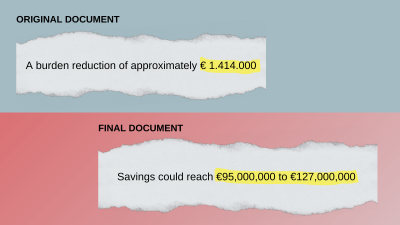Figures showing that there would be very small financial savings from a deregulation policy with high social costs disappeared from a European Commission document before its publication.
The Commission last month launched a proposal on the e-declaration for the posting of workers, which included a plan to reduce the quantity of information employers need to provide about the workers they are sending to work in different countries.
That would make it even harder for already overstretched labour inspectorates to know which workplaces they need to visit to tackle endemic abuse faced by posted workers, such as the non-payment of wages and dangerous working conditions.
‘Burden’ of €11
The average cost to employers of declaring a posted worker is currently a modest €10.78. The initial version of the Commission’s staff working document said that there would be a saving of just €1.414.000 under the new system if it was adopted by the nine member states which have expressed an interest in using it.
Even if every member state implemented the system, the total savings for European business would only be “approximately €13.945.000”, the document admitted.
However, these figures were not included in the final version of the document. Instead, it claimed the savings would be between €95 million and €342 million (see notes for full details.)
Social progress test
While the lower figure was based on the Commission’s own estimate, the source of the higher figure is a 3-page position paper the German Mechanical Engineering Industry Association. The Commission itself says the paper is “based on German labour costs, which are above the EU average for hourly rates.”
The Commission did not make any estimation of the social costs of lowering reporting standards, and did not properly assess the information needs of labour inspectorates to effectively enforce the rules on posting. But a report by the European Labour Authority warns: “The setting up of letterbox companies, the non-respect of working conditions, bogus self-employment, fraudulent PD A1 forms and illegal employment of third country nationals or their fraudulent posting represent the most significant and recurrent violations and abusive practices.”
That is why the European Trade Union Confederation (ETUC) is calling for a Social Progress Test to be added to the ‘Better Regulation’ process to ensure future decisions are not based solely on cutting costs for business, but also uphold the EU’s own social and economic goals.
ETUC Deputy General Secretary Isabelle Schömann said:
“The vast difference in numbers between these two documents begs serious questions about the credibility of claims being made about the supposed benefits of deregulation. Are the savings really 25 times higher than the Commission’s initial estimation or were unverified figures from a partisan source cherry picked at the last moment to fit an ideological deregulation drive?
“The Commission has a duty to properly consider the impact of policies on workers, consumers, public authorities and the environment, not only on businesses. Instead, this episode gives the appearance of a policy making process is being driven by the need to meet an arbitrary target of cutting regulation by 25%, without due consideration to any other consequence.
“In this case, the proposal would mean employers could provide less information about workers they are sending to building sites, factories or farms in other countries. Posted workers already face non-payment of wages, social security fraud and dangerous conditions, and this proposal would make it even easier for them to be exploited.
“We see the same kind of rhetoric about the ongoing revision of the EU Regulations on Social Security Coordination, with the business lobby calling for notification exceptions, even though the cost of requesting the relevant certificate is even less than 11 Euros.
“The truth is that whenever you scratch beneath the surface of corporations’ deregulation rhetoric, it’s clear the social costs of slashing standards are far higher than the so-called ‘regulatory burden’ for big business. Let’s be clear: making sure that workers are properly insured is not a burden on business.”
Notes:
Original Commission Staff Working Document:
“At the EU level, it is estimated that the adoption of the standard form and the use of the multilingual public interface by the 9 Member States in question would lead to a burden reduction of approximately € 1.414.000 compared to the current baseline situation. This is the product of the time and cost savings registered in the 9 Member States in question, multiplied by the frequency of posting declarations submitted to the above-mentioned Member States, compared to the baseline administrative cost at the EU level under the current 27 different national declaration procedures. The burden reduction for service providers would further increase significantly if all 27 EU Member States would join this initiative. The analysis estimates a reduction of 81% at the EU level, corresponding to approximately €13.945.000, compared to the baseline situation.”
Final Commission Staff Working Document:
“The savings in administrative burden for postings to this initial group of Member States could therefore reach a maximum amount of EUR 95 million to EUR 127 million. The burden reduction for service providers would be highest if all 27 Member States were to join this initiative. Given the overall estimated administrative burden for the posting of workers of EUR 477 million and EUR 635 million (as reported in section B above, an estimated rate of savings to this current administrative burden of 54% would translate into overall savings between EUR 257 million and EUR 342 million.”

